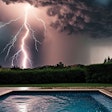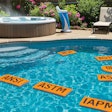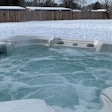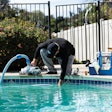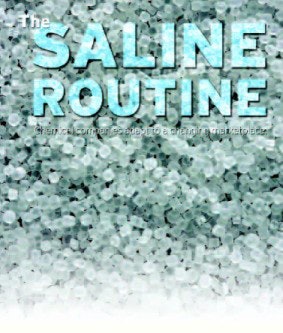
By now the story of the salt chlorine generator's rise to prominence in the alternative sanitizer category is a familiar one to pool pros everywhere: its 25-year ascent to total dominance in Australia, its awkward first steps after immigrating to the U.S. and its rapidly widening acceptance here. Estimates vary, but most agree that at least one-third of new pools built today come equipped with a salt chlorine generator, or saline generator, as they're sometimes called.
But even though customers are becoming more aware of the benefits of making chlorine on site with salt water, some erroneous notions still exists about exactly what the product does and doesn't do. The most-common questions can be answered thusly: Yes, it makes its own chlorine from salt. No, it's not a chemical replacement.
At the same time, while dealers know this information and can share it with their customers, some are still wary about salt generators and their effect on chemical sales. Without the need for chlorine , they wonder, exactly what are they going to be buying from me.
Thankfully, chemical companies have some answers. First, they're leading the charge by emphasizing that salt chlorine generators don't replace chemical maintenance. On this point all the chemical manufacturers speak as one. But some manufacturers have gone a step further and developed new products designed to work with the generators to keep pools clean and to maximize the effectiveness of the devices themselves. These companies hope their salt-specific formulations will follow the same upward trajectory as the generators they're made to mingle with. And dealers hope consumers will pay attention to warnings that chemical upkeep is still needed and that they'll keep coming back to the store for chemicals.
Taking Notice
"It was about three, four years ago that salt started really taking off," says Art Harre, general manager for Haviland Consumer Products, a chemical supplier in Grand Rapids, Mich. "And we had a partnership with a guy at a company out of Australia, and he always talked about how big salt was down there. So he says, 'It's going to come, so you guys have got to be ready.'"
That's pretty much how it happened at BioGuard, too, according to Scott Newton, marketing manager for the Lawrenceville, Ga., company.
"We'd seen it through our Australian division, where somewhere between 70 and 80 percent of all pools use saline generation," he explains. "And when we started looking at the category and we saw what other people were saying — the claims that they were making — we saw an opportunity.
"What we look at is, how can you make the system better for the consumer; have better-quality water, have protection for the equipment and take care of some of the inherent situations that occur with a saline generation system."
We'll get back to what Newton describes as the systems' inherent situations later, but suffice it to say, chemical companies aren't any more willing than their dealers are to let chemical customers slip away. And keeping them coming for chemicals, Newton says, is as simple as keeping them informed.
"Some consumers think that it's a non-chlorine system," he explains. "I don't know that they've been duped into believing it, I just think that because the chlorine is made in the pool itself and [the customers] are not adding chlorine, they have a mental image that it's a non-chlorine system. I think they forget about the other parameters because the water just looks so good. You're constantly getting a chlorine feed, and it's a very user friendly system, so there's a tendency to think, 'Well, if it looks good I really don't have to do anything.'"
Harre agrees with Newton about the need to inform pool owners about proper water treatment of salt pools, but he feels the problem exists because a few manufacturers oversold the public on the benefits of the devices. "What do salt generators do. They create chlorine," Harre says. "So we said, 'OK, that's fine and dandy.' But the problem is some of these salt generator manufacturers are trying to tell the masses — the customers and distributors and dealers — 'Nah, you don't need any chemicals now.' Which is completely wrong. You still need to make sure you balance your water correctly.
"So, fine, that thing is making chlorine. We decided to produce a series of products that make that chlorine work a lot more efficiently."
The key to making the generators work more efficiently and keeping the water in balance, chemical professionals like Harre and Newton say, is understanding how chlorine generators affect the water and how that water, in turn, affects the generator.
"What we learned from our Australian operation is that, there is a natural occurrence of an elevated pH as the system is used," Newton explains. "And when pH goes up and your alkalinity stays the same, but you have a calcium hardness in the level that's recommended, you could get into a scaling situation. That would cause scaling on the plates that generate the electricity to make the hypochlorous acid. And those cells are one of the most expensive parts of the system."
To combat that problem, BioGuard came out with two products, Beginnings and Renewal. Beginnings, as the name suggests, is added when a salt-chlorine pool is first started up.
"It adds everything at the appropriate levels so that you have a great swimming experience," Newton says, adding that the company developed the product because specialty salts were needed but unavailable when generators started gaining traction here. "So we developed a product that has all the trace minerals you needed for a saline generation system and we added some buffering salts, we added some pH balancers, we added some clarifiers, scale inhibitors, chlorine stabilizers, etc.
"One bag of Beginnings treats 10,000 gallons. It's a formulate mineral blend and you use it instead of the regular salt at startup. They may need to add more Beginnings if they drain down at closing, but generally if they use Renewal (BioGuard's weekly upkeep product) and don't drain down they should be fine."
Hard Sell?
Hardly You may be wondering, If customers buy salt chlorine generators so they don't have to handle chemicals, how are they going to react when I tell them they're going to need to add a bit of this and a touch of that every week.
It comes back to education and to your credibility as a pool-chemistry expert. Tell them what the generator does and doesn't do, and how proper testing and chemical dosing improves the water and ensures the generator's maximum performance. It also doesn't hurt to simplify the routine for them.
"We want to provide consumers who have pools equipped with salt water chlorine generators an easy way to accomplish the pool maintenance items that exist in every pool — whether sanitized with chlorine generators or any other way," says Mike Moore, vice president, marketing, for Advantis Technologies in Alpharetta, Ga. "This involves providing the consumer with a convenient kit with the products needed to take care of these pools, such as a non-chlorine shock, algaecide and sequestering agent. We see the packaging of these necessary specialties as a way to make pool maintenance quicker and easier."
Advantis offers salt-water specialty kits in both the GLB and Robarb lines, each of which were introduced last fall for use during the past swimming season. In addition to the shock, algaecide and sequestrant Moore mentioned, the kits contain clarifiers and a helpful maintenance guide for reference.
"The maintenance guide explains that, even though they don't have to add chlorine, it's still necessary to perform maintenance items such as backwashing, cleaning the filter, balancing the pH and alkalinity, adding an algaecide, etc.," Moore adds.
For some customers, an appeal directly to the pocketbook works best.
"They can protect their investment by keeping the pool in balance," Newton points out. "The idea behind Beginnings and Renewal is to enhance the swimming experience and to make sure that the equipment that somebody has purchased is working and continues to work at the optimal level."
Packaged Purification
Like chlorine generators were a decade and a half ago, salt-specific chemicals are just beginning to attract attention in the United States. But early indications are that they're catching on quickly.
"The Ocean Breeze Salt Support has been a huge success for us," says Haviland's Harre. "You put it in and it's going to stay in for the life of the water, and then you just need to add some Breeze Support later on down the road, probably once every two or three weeks, depending on usage and all of that fun stuff. But those are selling like gangbusters right now."
Harre says Haviland will unveil a complete line of products to complement the two it's already selling at the trade shows this fall. Among the new products will be a shock that's specially formulated to work in conjunction with salt pools, according to Harre. Having an entire system, he believes, will help sell the products.
"So the homeowner comes in and she goes, 'I've got a salt generator pool,'" Harre says. "You want her to look down to the end of the counter and say, 'Oh, there they are. There's the salt shock, salt support products, all the products you need to add.
"I know how all the dealers were feeling. They were like, 'Hey, wait a minute . . .' Even though it was a $1,200 sale, they were afraid they weren't going to see this person back. So we are dispelling that myth. Salt chlorine generators are a good thing. In the long run the customer is probably going to save money. But you still need these other things."
Part of the problem, Newton says, is that the water in a salt chlorine pool looks so good that the customer tends to forget about it. That's where the customer needs your expert advice — and some of the products off your shelves.
"The customer needs to get into the habit of adding things on a weekly basis to keep the system running optimally," he says. "It's like my car. They tell me to change the oil every 3,000 miles. Now, if I didn't change it for 14,000, it probably would still run, but I'm not doing it any good."





































